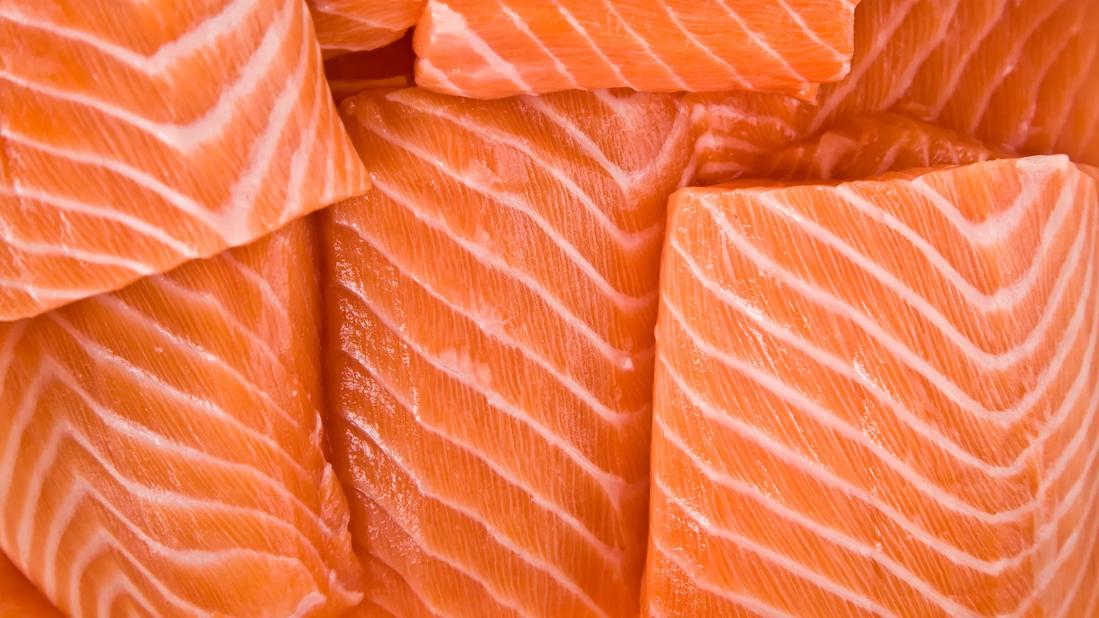Eat this fatty fish two times a week to support your muscle, brain and heart health

Image content: This image is available to view online.
View image online (https://assets.clevelandclinic.org/transform/90a7f586-d8d6-4574-bb99-faa50e93a054/salmon-117869626)
Raw salmon filets overlapping each other
Salmon’s pink color and rich buttery flavor make it a standout as far as fish dishes go. Luckily, it’s also incredibly good for you.
Advertisement
Cleveland Clinic is a non-profit academic medical center. Advertising on our site helps support our mission. We do not endorse non-Cleveland Clinic products or services. Policy
“Salmon is great for your heart, mental health and muscle mass,” says Julia Zumpano, RD, LD. “Eating it just a couple times a week can help support an active lifestyle and a healthy weight.”
Zumpano shares the many health benefits of salmon that make it worth adding to your plate.
The type of salmon you eat is either wild-caught or farmed. But due to its popularity and the decreasing amount of this fish in the sea, about 70% of the salmon produced around the world is farmed.
A serving size of 3 ounces of farmed salmon (cooked) provides:
The same serving of salmon also provides these important nutrients:
The same amount of cooked wild-caught salmon has fewer calories, less saturated fat and slightly more protein and omega-3.
In general, fish is a good source of protein, vitamins and minerals — and salmon is no exception. But it brings other specific benefits, too.
“Salmon is especially good for you because it’s high in omega-3 fatty acids and low in mercury,” Zumpano explains. “Mercury may be harmful to humans in high amounts.”
Advertisement
Let’s take a closer look at each of salmon’s health benefits.
Omega-3 fatty acids are heart-friendly because they may decrease blood pressure, lower triglycerides and reduce “bad” cholesterol.
“The omega-3s in salmon can protect your heart,” Zumpano says, “especially when it’s eaten as part of a Mediterranean or plant-based diet.”
Adding even a small amount of salmon to your diet could help with thinking and memory, or what doctors call “cognitive function.”
“Fish high in omega-3 fatty acids have anti-inflammatory effects and may help with cognitive aging,” Zumpano reports.
Research suggests that eating more omega-3 fatty acids may strengthen your hippocampus, the area of your brain associated with memory and learning. Plus, experts continue to study the effect of eating fish on the progression of dementia and Alzheimer’s disease.
The U.S. Food and Drug Administration (FDA) recommends eating two servings of fish weekly. But research shows that even one weekly serving of salmon is associated with a lower risk of depression, especially in women.
“Salmon is also high in vitamin D, which research has shown is critical for mental health,” Zumpano notes. “Vitamin D can help with your overall mood and with regulating your sleep.”
Salmon has both protein and omega-3 fatty acids, which are important for muscle development. Research says eating two servings of salmon a week can significantly increase muscle mass (or your total amount of muscle).
“Salmon is a nutrient-packed complete source of protein,” Zumpano says. “It’s a great choice for helping build muscle.”
No single food can keep you safe from cancer. But studies show that people who eat more salmon increase their protection against colorectal cancer.
More research is still needed, but Zumpano says there’s reason to believe that salmon has protective properties against cancer. It’s high in antioxidants, which can help:
One serving of salmon provides more than half the recommended daily amount of vitamin D. While vitamin D isn’t directly responsible for bone health, it helps get calcium to your bones.
“Vitamin D is critical for calcium absorption, bone health and preventing osteoporosis,” Zumpano explains. “Salmon is a natural way to ensure you’re getting enough vitamin D.”
Salmon is generally safe to eat, especially when it’s fully cooked. But eating it raw or undercooked can raise your risk of illness. The main concerns include parasites and bacteria.
Advertisement
“For most people, though, the health benefits of salmon far outweigh the risks,” Zumpano clarifies, “especially when it’s sourced from a reputable supplier and then properly prepared.”
In other words? Feel free to get hooked on salmon!
Advertisement

Sign up for our Health Essentials emails for expert guidance on nutrition, fitness, sleep, skin care and more.
Learn more about our editorial process.
Advertisement
From your head to your heart, shrimp can provide some solid benefits
Salmon and herring are some of the best choices
For most healthy people, raw fish is safe, but following safety guidelines is key
Debating the health benefits and risks
The benefits of eating this ‘nutritional powerhouse’
The best rolls, sashimi and appetizers you can eat
Can you enjoy raw fish without the risk?
The health benefits of these shelled beauties just might convert you
Although it could be used as a moisturizer, this new trend is not recommended
Communicating clear limits helps protect your time, energy and emotional well-being
High cholesterol can be genetic, but testing and treatment can lower your heart disease risk